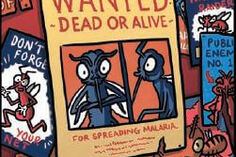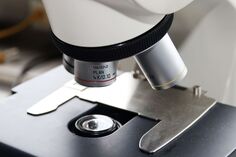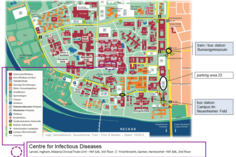Why is Parasitology so important?
About one third of deaths are due to infectious diseases. In addition to acute respiratory infections, AIDS and tuberculosis, parasitic diseases substantially contribute to this dismal fact. Parasitoses are particularly frequent in the tropics where underdevelopment, malnutrition, bad hygiene and poverty create a fertile breeding ground for malaria, sleeping sickness, schistosomiasis, amoebiasis and many others.
Earlier successes in the control of tropical diseases have been all but lost. First line drugs now frequently fail because of wide spread resistances. The same is true for insecticides. Once widely used to prevent disease transmission by vectors, resistance mechanisms have rendered their application ineffective. New and effective strategies to control parasitic diseases are difficult to come by, given that our knowledge of the etiological agents and their pathogenic interactions with the human host is still rudimentary.
Medical Parasitology
Research on tropical diseases commenced at the turn of the 19th century, driven by the territorial and economic aspirations of Europe's colonial powers. Soon after, important achievements were made, most notably the discovery of chemotherapeutics for treatment and prophylaxis. German scientists took a great part in these discoveries. Paul Ehrlich developed a drug against African sleeping sickness, called suramin, which was one of the first chemotherapeutics ever made. For his ground breaking research on the development of chemotherapeutics, Paul Ehrlich received the Nobel Prize in 1921. In the early 30s, Research teams of the pharmaceutical company Bayer developed the first synthetic antimalarial drugs, such as chloroquine.
With the availability of successful intervention strategies, interest in research on infectious diseases quickly declined. Only the recent resurgence of some parasitic diseases, such as malaria and trypanosomiasis, at an unprecedented scale with millions of people infected has raised public awareness again. Our roots Recognizing the need for expertise in parasitology, the University of Heidelberg established a Department of Parasitology in 1965. The first director was Hermann Peters. He was succeeded by Erhard Hinz in 1976. In 1998, with the nomination of Michael Lanzer as the chair for Parasitology, the department was restructured to strengthen its research activities.
Current focus
Today's Department of Parasitology has an interdisciplinary orientation, combining clinical research with molecular, biochemical and physiological approaches to address questions relating to the pathophysiology and management of parasitic diseases, in particular malaria, leishmaniose and toxoplasmosis. The international character of the department is illustrated best by the fact that many of the more than 50 scientists working in one of our research groups are from abroad.
Our roots
The department is embedded in an extensive network of collaborations, at the local, national and international level. Mutual partnerships exist with several research groups in malaria endemic countries, ensuring proximity and relevance of our research to the people in need. In addition a malaria field station in Burkina Faso has been created in collaboration with the Ministry of Health, Burkina Faso. A big thank you for financial support of our research over the past years goes to the Alexander von Humboldt Foundation, the Baden-Württemberg Foundation, the Bill & Melinda Gates Foundation, the Chica & Heinz Schaller Foundation, the Daimler & Benz Foundation, the European Commission, the German Research Foundation, the German Academic Exchange Service, the International Human Frontier Science Program Organisation, The Wellcome Trust as well as the Federal Minstry of Education and Research.





